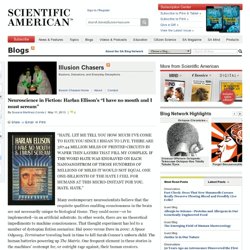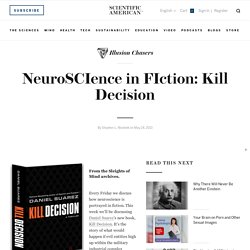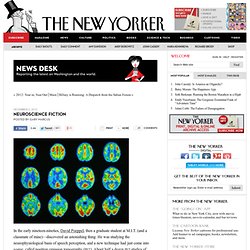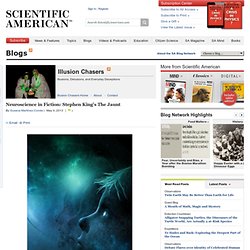

Neuroscience in Fiction: Harlan Ellison’s “I have no mouth and I must scream” Many contemporary neuroscientists believe that the requisite qualities enabling consciousness in the brain are not necessarily unique to biological tissue.

They could occur—or be implemented—in an artificial substrate. In other words, there are no theoretical impediments to machine consciousness. NeuroScience in Fiction: Kill Decision. From the Sleights of Mind archives.

Every Friday we discuss how neuroscience is portrayed in fiction. This week we’ll be discussing Daniel Suarez’s new book, Kill Decision. It’s the story of what would happen if evil entities high up within the military industrial complex developed autonomous unmanned war machines and imbued them with a simple algorithm: behave like a weaver ant. It’s a fantastic premise that thoroughly imagines just how fearsome a swarm of inexpensive, simple-minded, toy-like helicopters would be if they were armed and given the territorial sensibilities of the most warlike animal on the planet. The plot orbits around the idea that the evil industrialists, having now invented and perfected the new wave in warfare, must first create a market, which is accomplished by using more traditional (but still autonomous) unmanned aircraft to attack civilian targets around the globe and in the US.
A terrific, exciting, and chilling read. Stephen L. Neuroscience in Fiction: Proust and Pixar. The madeleine episode in Swan’s Way (Proust, 1928) exemplifies the power of smells and tastes to bring back memories. This experience, sometimes dubbed the Proust phenomenon, has inspired dedicated research, as well as further fictional examples. Psychologists Herz and Schooler designed an experiment to put Proust’s hypothesis to the test. They presented odors, words, and images to experimental participants and found that the memories evoked by odors were more emotional than memories evoked by either words or images of the same objects. Also, odor-evoked memories “ tended to make participants feel more ‘brought back’ to the original event ”.
Which brings me back to a fairly recent example of the Proust phenomenon, courtesy of Pixar. Neuroscience in Fiction: Nexus (Mankind Gets an Upgrade) Neuro-fiction: A guide to dissecting overblown neuroscience headlines. Neuroscientist Molly Crockett has a secret to share: if you want to make better decisions, eat a grilled cheese sandwich.
In today’s talk, filmed at the TEDSalon in London, Crockett shares how she accidentally had a part in circulating this message. Several years ago, Crockett and her fellow researchers set out to study how serotonin would effect reactions when a person felt that they were treated unfairly. They manipulated serotonin in a study by giving participants a beverage designed to deplete the brain of the amino acid tryptophan, which gets converted into serotonin. The study found that, when tryptophan was low, people were more likely to seek revenge when they felt mistreated. “That’s the study we did. “At this point you might be wondering, ‘Did I miss something? This kind elision happens all the time as the press reports on neuroscience.
“Neuroscience is turning up more and more in marketing,” says Crockett. “You Love Your iPhone. What Neuroscience Really Teaches Us, and What It Doesn't. In the early nineteen-nineties, David Poeppel, then a graduate student at M.I.T.

(and a classmate of mine)—discovered an astonishing thing. He was studying the neurophysiological basis of speech perception, and a new technique had just come into vogue, called positron emission tomography (PET). About half a dozen PET studies of speech perception had been published, all in top journals, and David tried to synthesize them, essentially by comparing which parts of the brain were said to be active during the processing of speech in each of the studies. What he found, shockingly, was that there was virtually no agreement. Every new study had published with great fanfare, but collectively they were so inconsistent they seemed to add up to nothing. This was terrible news for neuroscience—if six studies led to six different answers, why should anybody believe anything that neuroscientists had to say? Neuroscience in Fiction: Stephen King’s The Jaunt. “Your mind can be your best friend; it can keep you amused even when there’s nothing to read, nothing to do.

But it can turn on you when it’s left with no input for too long. It can turn on you, which means that it turns on itself, savages itself, perhaps consumes itself in an unthinkable act of auto-cannibalism.” Stephen King - The Jaunt Granted, Stephen King is not the first name that comes to mind when you think about neuroscience insights, but this week’s Neuroscience in Fiction pick will give you a lot to ponder. The Jaunt is part of King’s Skeleton Crew short story collection, and one of the most engaging sci-fi tales I’ve read.
The Jaunt explores the limits of sustained sensory deprivation on the mind, with just a little bit of gore thrown in for added effect. For extra credit, check out Sleights of Mind for our thoughts on the neuroscience of sensory deprivation. We hope you enjoy The Jaunt.